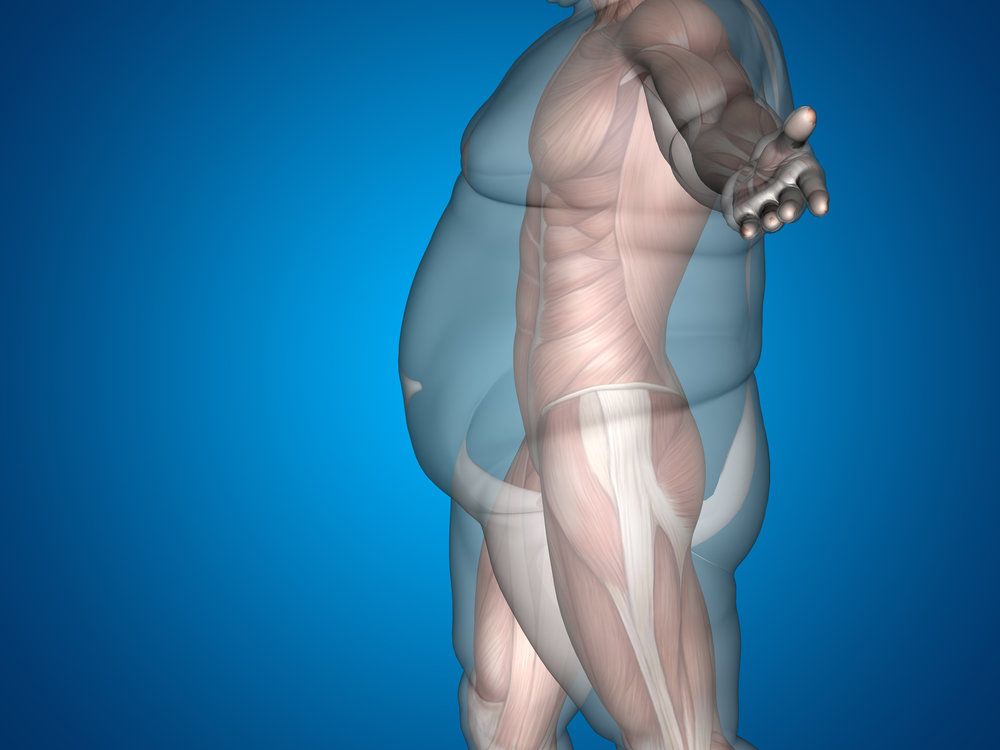DEBUNKING THE THYROID OBESITY MYTH + 6 WEIGHT LOSS TIPS & TRICKS
Let’s debunk this myth once and for all.
No doubt you’ve heard people claim that their weight gain is due to having thyroid problems.
The reply is always something along the lines:
“Blaming your thyroid is an excuse for not having self control or for being lazy”.
But is this really true?
Not really, in fact the science supports the exact opposite.
This is a big deal for patients who are overweight or for those with thyroid problems because it validates what they are going through.
Your Thyroid and Weight Gain
You’re left to believe that weight gain is the direct cause of eating too much and exercising too little.
This message is crammed down your throat on a near daily basis.
While eating excess calories certainly won’t help your weight loss it’s rarely the sole CAUSE of excess weight.
Instead you need to think about weight gain and obesity as a metabolic disorder.
A disorder that stems from underlying hormone imbalances that may be caused by the type and quantity of food that you eat, your activity level, your environment and your mental status.
This is a jump from the conventional way of thinking about weight gain but it is a much more accurate representation of what is actually happening.
Let’s apply this thinking to weight gain and your thyroid:
We know that your weight is intricately connected to thyroid function, this isn’t up for discussion – studies show this to be the case.
Thyroid hormone (specifically T3) is responsible for activating mitochondrial energy production, for increasing heat production and for regulating the metabolism of your entire body.
To suggest that hypothyroidism does not cause weight gain would be to go against the standard physiology of thyroid function as we understand it.
So why do people still believe that there is no connection between weight gain and thyroid function?
Much of this controversy stems from the current treatment paradigm as it relates to thyroid hormone replacement.
Let’s consider this:
If you are hypothyroid (meaning you have low thyroid function in your body) and it is causing you to gain weight, doesn’t it make sense that replacing that thyroid hormone with medication like Levothyroxine would cause you to lose weight?
It makes perfect logical sense but that isn’t what we see in clinical practice.
You know this if you’ve taken levothyroxine or other thyroid medication.
In most cases replacing the lost thyroid in your body doesn’t cause any net change to your weight and in some cases it may actually cause you to gain weight.
We can basically take two approaches to this problem as we see it in clinical practice:
First (this is the position that most people take) – You can double down on your position that the thyroid has no impact on weight and that any weight gain must be caused by the patient.
Second (the better option) – You can rethink the treatment and current understanding of thyroid function to see if science is missing something.
The truth is that most physicians have failed patients when it comes to weight loss.
Doctors are stuck in a 20 year old understanding of weight loss and they are all too eager to blame the patient instead of looking inward.
Thyroid hormone management has become “streamlined” into a simple algorithm that basically flows like this:
Is the TSH Normal?
If TSH is > 5.0 then slightly increase dose of Levothyroxine/Synthroid (or start medication if patient isn’t already on it)
If TSH is < 1.0 then lower dose of Levothyroxine/Synthroid.
But what if the patient is fatigued, is having hair loss, is gaining weight or has all of the symptoms of hypothyroidism?
It doesn’t matter because the TSH is normal, therefore these symptoms MUST be caused by something else.
Does this even sound logical?
How can something as complex as a hormone which interacts at a nuclear level in basically every cell in the body be controlled by 1 single measure?
What if instead of focusing on the TSH we evaluated your thyroid in the context of your symptoms? What if we took into consideration other hormones and how they interact with thyroid hormone in the body? What if we evaluated how well you are actually converting T4 to T3 in peripheral tissues? What if we considered the fact that some tissues may have a higher DEMAND for thyroid hormone than other tissues?
Does this sound like a better approach then basing treatment off of the TSH?
If this sounds crazy it’s because it is, so let’s debunk the thyroid obesity myth using some practical and logical studies:
#1. Obesity CAUSES Hypothyroidism
Let’s break this down:
First you need to realize that being overweight is NOT a normal condition and having excess fat cells in your body really does wreak havoc on normal hormone systems in your body.
Simply gaining 10-20 pounds is enough to trigger this cascade of hormone imbalances:
First -> Excess fat cells (adipocytes) secrete a hormone called leptin. Excess levels of leptin lead to leptin resistance and changes to TSH.
Second -> Leptin resistance directly leads to an increase in TSH but also… (skip to #4)
Third -> Fat cells promote local inflammation (adiposopathy) and systemic inflammation.
Fourth -> Inflammation and Leptin resistance reduces peripheral T4 to T3 conversion causing tissue level hypothyroidism.
Fifth -> Overweight patients try various diets through calorie restriction which increases reverse T3 and leads to low T3 syndrome.
This cascade of events is very well documented, but just not well known among physicians (or if it is it tends to be ignored).
The point is this:
Even if your thyroid didn’t CAUSE your weight gain to begin with it is most certainly being worsened by having extra fat on your body.
This is important because it expands our understanding of hypothyroidism and weight gain and may actually help physicians understand how these hormone systems interact with one another.
#2. Calorie restriction CAUSES Low T3 Syndrome + Hypothyroidism
Again, this is another well documented consequence of dieting.
Calorie restriction (as defined by 21 days of less than 1,000 calories per day) is enough to LOWER thyroid function.
This is felt to be a protective mechanism by the body.
So how does it work?
Remember when we said that your thyroid helps control your metabolism?
Well when calorie consumption is low your body will act to try and match the amount of calories you are consuming to the amount that you are burning.
That means trying to “trick” your body into burning 2,000 calories when you only eat 1,000 calories is a lost cause.
Your body catches on and then dupes you in the process by lowering your total T3, increasing reverse T3 and by putting the brakes on your metabolism.
So instead of burning 2,000 calories per day your body lowers your metabolism down to 1,000 calories.
So as soon as you start eating more food guess what happens?
Your body starts packing on the pounds.
But the most important thing to understand in this section is that calorie restriction will NOT lead to long term weight loss!
This is especially true if you have existing hypothyroidism!
It will seriously only make your problem worse and lead to long term weight gain.
In this case the conventional advice from physicians to eat less and exercise more may actually cause more harm to your metabolism and make weight loss more difficult.
#3. Patients taking T3 tend to LOSE WEIGHT
Here is where things get interesting:
So we know that taking Levothyroxine and Synthroid don’t actually lead to weight loss, but what if other thyroid medications DID lead to weight loss?
Well, some studies support this hypothesis:
First study -> Studies support and confirm that using T3 thyroid only medication leads to weight loss in certain patient populations likely through its effects on thermogenesis.
Second study -> This study supports that switching patients from T4 only medications to natural desiccated thyroid (T4 + T3 combination medication) resulted in modest weight loss and most patients preferred the switch in medication.
Despite these results the authors concluded that the “quality of life” was not increased in these patients.
But let me ask you:
If you lost weight would your quality of life increase? I think so.
Third study -> Treatment with T4 only medications results in lower than normal T3:T4 concentrations even when the TSH is “normal” or considered “euthyroid”.
This study supports the idea that TSH may be an insufficient marker for assessing cellular thyroid levels.
We can assert that it’s not that thyroid hormone doesn’t cause weight loss but instead that T4 only medications like Levothyroxine and Synthroid don’t.
This supports the idea that patients tend to do much better when using a combination of T4 + T3 in their treatment and hormone regimen.
If you aren’t familiar with the differences in thyroid medication then I recommend that you read this post about Cytomel and weight loss and WP thyroid and weight loss.
As a quick primer:
T4 only medications include Levothyroxine, Synthroid, Tirosint -> These medications don’t tend to cause weight loss.
T3 only medications include Cytomel and Liothyronine -> These medications may help with weight loss.
T3 + T4 combination medications include Natural Desiccated Thyroid like Armour thyroid, WP thyroid and Naturethroid -> These medications may help with weight loss.
#4. TSH Tracks Perfectly with Weight
Lastly, which shouldn’t come as a surprise, is that changes to circulating TSH and thyroid hormones result in weight gain.
Specifically weight tends to track quite well with TSH and serum Free T4 levels.
As TSH rises (meaning you become hypothyroid) you will find that BMI rises as well.
As Free T4 levels fall weight tends to rise.
I’ve only included this section in here to confirm that hypothyroidism does indeed cause weight gain.
So now we have a double whammy:
Weight gain leads to reduced thyroid function and low thyroid function leads to weight gain.
Source: restartmed
“DEBUNKING THE THYROID OBESITY MYTH + 6 WEIGHT LOSS TIPS & TRICKS”


